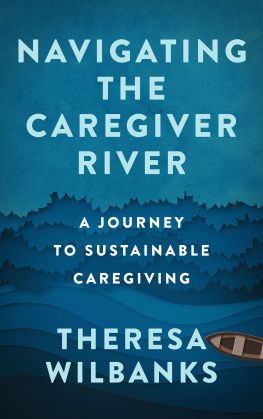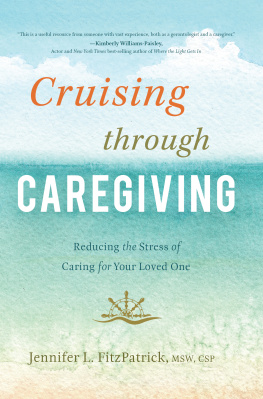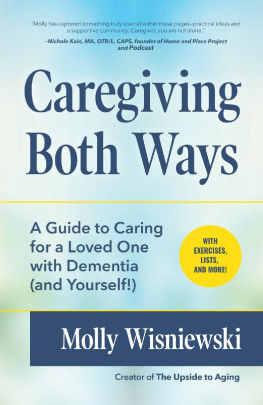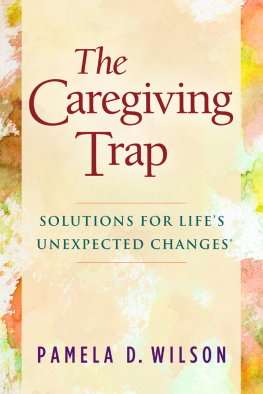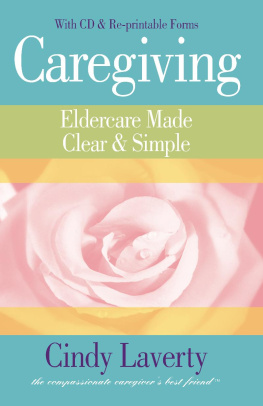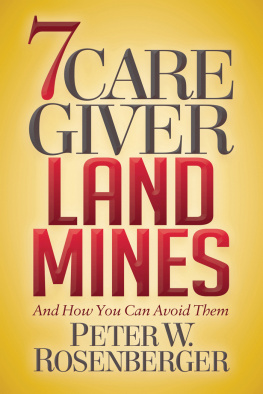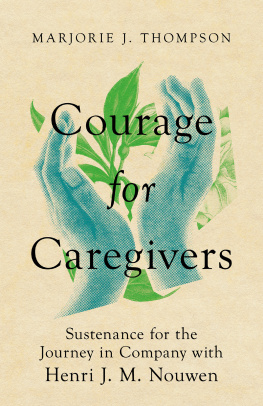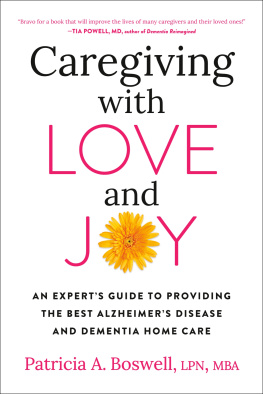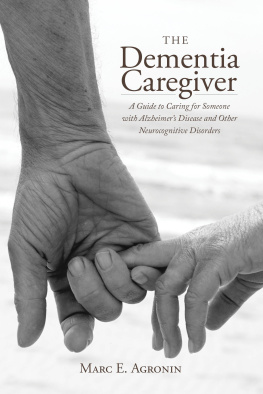Copyright 2022 Theresa Wilbanks.
All rights reserved. No part of this publication may be reproduced, distributed, or transmitted in any form or by any means, including photocopying, recording, or other electronic or mechanical methods, without the prior written permission of the publisher, except in the case of brief quotations embodied in critical reviews and certain other noncommercial uses permitted by copyright law. For permission requests, write to the publisher, addressed Attention: Permissions Coordinator, at the address below.
ISBN: 978-1-7379821-0-4 (Paperback)
ISBN: 978-1-7379821-1-1 (eBook)
The information in this book is for general information only; please contact your legal or financial advisors or medical provider for guidance on your particular situation.
Front cover image by Damonza
Book design by Damonza
First printing edition 2021.
www.sustainablecaregiving.com
In memory of my father who continued to teach me life lessons of courage, hope, and love as we navigated our caregiving journey together.
Introduction
My caregiving journey started like many others. I did not know that I was a caregiver. I was simply a dutiful daughter doing what I had seen my parents do for their parents. Looking back, well before my husband and I moved back from France to be closer to Dad, I was wading into caregiving, sticking a toe into the waters to check the temperature. From a hotel lobby in the Czech Republic, I listened as Dad shared that a friend had been on his laptop, had his password, and was trying to get him a better deal on health insurance. I called Dads friend and set clear boundaries with clear consequences around who may have access to Dads computer and who was authorized to get involved in his medical decisions. I didnt realize that I was advocating and functioning in the role of long-distance caregiver. I was only casually familiar with the concept of boundary setting. In my mind, I was just a protective daughter who was ready to jump on the next flight to Tampa if this person did not get out of Dads business.
From Wading to Drowning
By the time I connected with the term caregiver, I was drowning and burned-out. What started as running errands and helping with finances turned into a full-time, plus overtime, all-consuming job with no pay, no job description, no authority, and no appreciation. My services were both welcomed by Dad yet rejected as unnecessary because he believed that he was getting by just fine on his own. By the time I realized that my role had a title and my responsibilities could be defined, I was too overwhelmed to manage my job with the level-headedness I had previously possessed in my career. I rode waves of stress and worry of varying intensity throughout the days and nights. My path was not sustainable.
We had been in France for seven years on an open-ended contract. Our return to the US was sparked by a fire in Dads condo, started when a tray of candles burned through the tray, then his dresser as he napped. He initially downplayed the fire as a minor incident but revealed more details over time. It was clear that we should be closer than an ocean away.
Soon after we moved back, Dad had a stroke. In addition, it was evident to everyone but him that he should no longer drive. Then, his identity was stolen, twice. We were confident and grateful that our timing was appropriate. Looking back, I remember helping here and there, and it felt good to be of service. Next, I remember when every waking thought was a worry. I dont remember moving from one state of being to the next. The shift was gradual and likely started soon after the stroke and subsequent confrontations over the keys to the car. The loving, respectful relationship that Dad and I enjoyed began to crumble under this new caregiver, care receiver dynamic that neither of us wanted.
The Caregiver River
I came to see that the caregiving journey was like being in a raft on a river. There were calm sections, then rapids and swift water that knocked me off my feet, waterfalls that I didnt see coming, and obstacles that blocked forward momentum and caused traumatizing frustration. I was frequently tossed out of the raft and underwater. At times, I was out of the raft, scarcely holding on as we bounced from rock to log, at the mercy of the wild current. As I began to manage the experience with more confidence and agility, the river didnt change, but how I navigated the river changed.
When the overwhelm first set in, I could not understand why helping was so hard. None of the tasks or responsibilities were difficult on their own. Yet, feelings of anger, resentment, and guilt swirled like a whirlpool that pulled me under, undermining my confidence, compassion, and core values. As Dad resisted, I insisted. It felt like we were in combat. The conflicts wore down my resilience. I was angry that I was angry. I wanted to navigate this river and steer this raft rather than be tossed around at the mercy of the next clash, resistance, or broken system. Dad and I argued over driving, medication management, ladders, the stove, skydiving, his knee surgery at 97, and even blueberries. While I learned lessons from each of the skirmishes, the blueberry battle was a turning point. It was amazing what havoc could be wrought by a resealable bag of blueberries; I was ready to die on Blueberry Hill. Stepping off the battlefield, I understood more clearly when winning was losing, and I permanently put down the battle armor. I focused on big picture objectives such as maintaining relationships, helping Dad process his history, creating a peaceful environment, and getting to win - win. By releasing control, I gained control and began navigating.
Navigating
I set about dissecting the emotional challenges and studied tactics to counter each one. These tactics became strategies that I subjected to trial and error. The strategies included establishing routines, setting boundaries, cultivating compassion, forgiving myself and others, accepting the role, accepting help, letting go of expectations, and changing how I viewed obstacles. Through this new lens of acceptance, I discovered when losing was winning. A shift in perspective swung my attitude from frustrated to empowered. When we faced a new obstacle, I viewed it as an opportunity to improve our situation.
Sometimes the obstacle is in the way, and sometimes the obstacle is the way. Is it stopping us or showing us which way to go?
Ryan Holiday,
The Obstacle is The Way
Appreciating that we grow stronger as we navigate our caregiving journey, I recognized that within each struggle, I had the opportunity to develop skills and perspectives that would help now and beyond caregiving. The challenge was to pace myself, figure out what worked, and then figure it out again as the circumstances changed. I explored self-care and how it fit into this new reality. Journaling and counseling became my methods of venting. I replaced my non-strategy of wondering and worrying about what was around the next bend with creating an itinerary, planning, and preparing for the future.
A Sustainable Caregiving Foundation
As I continued to learn more about each strategy to manage stress, I combined the strategies. When the strategies began to work together, they began to work. Because challenges and needs were fluid and changed from day to day, sometimes from hour to hour, strategies and solutions had to be fluid. What worked one day to manage stress or circumstances didnt always work the next day. As I learned to modify my core set of strategies to fit the current situation, I was able to make the adjustments more quickly. The fluid-meets-solid, sustainable caregiving foundation for well-being was formed. The journey became an adventure, a meaningful pilgrimage, and a rite of passage.
I organized self-care activities, including sleep, nutrition, meditation, and exercise, into routines. I set boundaries to protect the routines. These combined strategies allowed me to focus on my well-being which replenished my compassion reserves and restored my capacity for compassion. When I reconnected to compassion, it was like putting on glasses with a new prescription, but instead of seeing things clearly again, I was
Next page
